1. Baumgart DC, Sandborn WJ. Inflammatory bowel disease: clinical aspects and established and evolving therapies. Lancet. 2007; 369:1641–1657. PMID:
17499606.

2. Rosen MJ, Dhawan A, Saeed SA. Inflammatory bowel disease in children and adolescents. JAMA Pediatr. 2015; 169:1053–1060. PMID:
26414706.

3. Sýkora J, Pomahačová R, Kreslová M, Cvalínová D, Štych P, Schwarz J. Current global trends in the incidence of pediatric-onset inflammatory bowel disease. World J Gastroenterol. 2018; 24:2741–2763. PMID:
29991879.

4. Ashton JJ, Cullen M, Afzal NA, Coelho T, Batra A, Beattie RM. Is the incidence of paediatric inflammatory bowel disease still increasing? Arch Dis Child. 2018; 103:1093–1094. PMID:
29519945.

5. Ghersin I, Khteeb N, Katz LH, Daher S, Shamir R, Assa A. Trends in the epidemiology of inflammatory bowel disease among Jewish Israeli adolescents: a population-based study. Aliment Pharmacol Ther. 2019; 49:556–563. PMID:
30687945.

6. Kaplan GG, Ng SC. Understanding and preventing the global increase of inflammatory bowel disease. Gastroenterology. 2017; 152:313–21.e2. PMID:
27793607.

7. Jung YS, Han M, Kim WH, Park S, Cheon JH. Incidence and clinical outcomes of inflammatory bowel disease in South Korea, 2011-2014: a nationwide population-based study. Dig Dis Sci. 2017; 62:2102–2112. PMID:
28593437.

8. Hong SJ, Cho SM, Choe BH, Jang HJ, Choi KH, Kang B, et al. Characteristics and incidence trends for pediatric inflammatory bowel disease in Daegu-Kyungpook province in Korea: a multi-center study. J Korean Med Sci. 2018; 33:e132. PMID:
29713253.

9. Lee HA, Suk JY, Choi SY, Kim ER, Kim YH, Lee CK, et al. Characteristics of pediatric inflammatory bowel disease in Korea: comparison with EUROKIDS data. Gut Liver. 2015; 9:756–760. PMID:
25963086.

10. de Bie CI, Paerregaard A, Kolacek S, Ruemmele FM, Koletzko S, Fell JM, et al. EUROKIDS Porto IBD Working Group of ESPGHAN. Disease phenotype at diagnosis in pediatric Crohn's disease: 5-year analyses of the EUROKIDS Registry. Inflamm Bowel Dis. 2013; 19:378–385. PMID:
22573581.
11. Levine A, Koletzko S, Turner D, Escher JC, Cucchiara S, de Ridder L, et al. European Society of Pediatric Gastroenterology, Hepatology, and Nutrition. ESPGHAN revised porto criteria for the diagnosis of inflammatory bowel disease in children and adolescents. J Pediatr Gastroenterol Nutr. 2014; 58:795–806. PMID:
24231644.

12. Kim JH, Yun S, Hwang SS, Shim JO, Chae HW, Lee YJ, et al. Committee for the Development of Growth Standards for Korean Children and Adolescents. Committee for School Health and Public Health Statistics, the Korean Pediatric Society. Division of Health and Nutrition Survey, Korea Centers for Disease Control and Prevention. The 2017 Korean National Growth Charts for children and adolescents: development, improvement, and prospects. Korean J Pediatr. 2018; 61:135–149. PMID:
29853938.

13. Levine A, Griffiths A, Markowitz J, Wilson DC, Turner D, Russell RK, et al. Pediatric modification of the Montreal classification for inflammatory bowel disease: the Paris classification. Inflamm Bowel Dis. 2011; 17:1314–1321. PMID:
21560194.
14. Lophaven SN, Lynge E, Burisch J. The incidence of inflammatory bowel disease in Denmark 1980-2013: a nationwide cohort study. Aliment Pharmacol Ther. 2017; 45:961–972. PMID:
28229470.

15. Everhov ÅH, Olén O, Ludvigsson JF. Editorial: importance of definition of inflammatory bowel disease and an increased incidence in children. Aliment Pharmacol Ther. 2017; 45:1369–1370. PMID:
28417497.

16. Shivashankar R, Tremaine WJ, Harmsen WS, Loftus EV Jr. Incidence and prevalence of Crohn's disease and ulcerative colitis in Olmsted County, Minnesota from 1970 through 2010. Clin Gastroenterol Hepatol. 2017; 15:857–863. PMID:
27856364.

17. Benchimol EI, Manuel DG, Guttmann A, Nguyen GC, Mojaverian N, Quach P, et al. Changing age demographics of inflammatory bowel disease in Ontario, Canada: a population-based cohort study of epidemiology trends. Inflamm Bowel Dis. 2014; 20:1761–1769. PMID:
25159453.
18. Shah SC, Khalili H, Gower-Rousseau C, Olen O, Benchimol EI, Lynge E, et al. Sex-based differences in incidence of inflammatory bowel diseases-pooled analysis of population-based studies from Western Countries. Gastroenterology. 2018; 155:1079–89.e3. PMID:
29958857.

19. Shah SC, Khalili H, Chen CY, Ahn HS, Ng SC, Burisch J, et al. Sex-based differences in the incidence of inflammatory bowel diseases-pooled analysis of population-based studies from the Asia-Pacific region. Aliment Pharmacol Ther. 2019; 49:904–911. PMID:
30773656.

20. Park SH, Kim YJ, Rhee KH, Kim YH, Hong SN, Kim KH, et al. Songpa-Kangdong Inflammatory Bowel Disease [SK-IBD] Study Group. A 30-year trend analysis in the epidemiology of inflammatory bowel disease in the Songpa-Kangdong district of Seoul, Korea in 1986-2015. J Crohn's Colitis. 2019; 13:1410–1417. PMID:
30989166.

21. Duricova D, Fumery M, Annese V, Lakatos PL, Peyrin-Biroulet L, Gower-Rousseau C. The natural history of Crohn's disease in children: a review of population-based studies. Eur J Gastroenterol Hepatol. 2017; 29:125–134. PMID:
27748673.
22. Van Limbergen J, Russell RK, Drummond HE, Aldhous MC, Round NK, Nimmo ER, et al. Definition of phenotypic characteristics of childhood-onset inflammatory bowel disease. Gastroenterology. 2008; 135:1114–1122. PMID:
18725221.

23. Kim HJ, Oh SH, Kim DY, Lee HS, Park SH, Yang SK, et al. Clinical characteristics and long-term outcomes of paediatric Crohn's disease: a single-centre experience. J Crohn's Colitis. 2017; 11:157–164. PMID:
27651220.

24. Attard TM, Horton KM, DeVito K, Darbari A, Oliva-Hemker M, Thompson R, Cuffari C. Pediatric jejunoileitis: a severe Crohn's disease phenotype that requires intensive nutritional management. Inflamm Bowel Dis. 2004; 10:357–360. PMID:
15475743.
25. Cosnes J, Cattan S, Blain A, Beaugerie L, Carbonnel F, Parc R, et al. Long-term evolution of disease behavior of Crohn's disease. Inflamm Bowel Dis. 2002; 8:244–250. PMID:
12131607.

26. Walters TD, Kim MO, Denson LA, Griffiths AM, Dubinsky M, Markowitz J, et al. PRO-KIIDS Research Group. Increased effectiveness of early therapy with anti-tumor necrosis factor-α vs an immunomodulator in children with Crohn's disease. Gastroenterology. 2014; 146:383–391. PMID:
24162032.

27. Kang B, Choi SY, Kim HS, Kim K, Lee YM, Choe YH. Mucosal healing in paediatric patients with moderate-to-severe luminal Crohn's disease under combined immunosuppression: escalation versus early treatment. J Crohn's Colitis. 2016; 10:1279–1286. PMID:
27095752.

28. Choi J, Kang B, Kim MJ, Sohn I, Lee HJ, Choe YH. Early infliximab yields superior long-term effects on linear growth in pediatric Crohn's disease patients. Gut Liver. 2018; 12:255–262. PMID:
29298460.

29. Bouguen G, Levesque BG, Feagan BG, Kavanaugh A, Peyrin-Biroulet L, Colombel JF, et al. Treat to target: a proposed new paradigm for the management of Crohn's disease. Clin Gastroenterol Hepatol. 2015; 13:1042–50.e2. PMID:
24036054.

30. Kang B, Choe YH. Early biologic treatment in pediatric Crohn's disease: catching the therapeutic window of opportunity in early disease by treat-to-target. Pediatr Gastroenterol Hepatol Nutr. 2018; 21:1–11. PMID:
29383299.

31. Birimberg-Schwartz L, Zucker DM, Akriv A, Cucchiara S, Cameron FL, Wilson DC, et al. Pediatric IBD Porto group of ESPGHAN. Development and validation of diagnostic criteria for IBD subtypes including IBD-unclassified in children: a multicentre study from the Pediatric IBD Porto Group of ESPGHAN. J Crohn's Colitis. 2017; 11:1078–1084. PMID:
28430891.

32. Shi HY, Levy AN, Trivedi HD, Chan FKL, Ng SC, Ananthakrishnan AN. Ethnicity influences phenotype and outcomes in inflammatory bowel disease: a systematic review and meta-analysis of population-based studies. Clin Gastroenterol Hepatol. 2018; 16:190–7.e11. PMID:
28603049.

33. Kim BJ, Song SM, Kim KM, Lee YJ, Rhee KW, Jang JY, et al. Characteristics and trends in the incidence of inflammatory bowel disease in Korean children: a single-center experience. Dig Dis Sci. 2010; 55:1989–1995. PMID:
19763825.

34. Jin WS, Park JH, Lim KI, Tchah H, Ryoo E. Significance of perianal lesion in pediatric crohn disease. Pediatr Gastroenterol Hepatol Nutr. 2018; 21:184–188. PMID:
29992118.

35. Kang B, Lee Y, Lee K, Choi YO, Choe YH. Long-term outcomes after switching to CT-P13 in pediatric-onset inflammatory bowel disease: a single-center prospective observational study. Inflamm Bowel Dis. 2018; 24:607–616. PMID:
29390113.

36. Kang B, Choi SY, Choi YO, Kim MJ, Kim K, Lee JH, et al. Subtherapeutic infliximab trough levels and complete mucosal healing are associated with sustained clinical remission after infliximab cessation in paediatric-onset Crohn's disease patients treated with combined immunosuppressive therapy. J Crohn's Colitis. 2018; 12:644–652. PMID:
29474531.

37. Kang B, Choi SY, Choi YO, Lee SY, Baek SY, Sohn I, et al. Infliximab trough levels are associated with mucosal healing during maintenance treatment with infliximab in paediatric Crohn's disease. J Crohn's Colitis. 2019; 13:189–197. PMID:
30452616.

38. Assa A, Amitai M, Greer ML, Castro DA, Kuint RC, Martínez-León M, et al. ImageKids Study Group. Perianal pediatric crohn disease is associated with a distinct phenotype and greater inflammatory burden. J Pediatr Gastroenterol Nutr. 2017; 65:293–298. PMID:
28362690.

39. Adler J, Dong S, Eder SJ, Dombkowski KJ. ImproveCareNow Pediatric IBD Learning Health System. Perianal crohn disease in a large multicenter pediatric collaborative. J Pediatr Gastroenterol Nutr. 2017; 64:e117–24. PMID:
27801750.

40. Short SS, Dubinsky MC, Rabizadeh S, Farrior S, Berel D, Frykman PK. Distinct phenotypes of children with perianal perforating Crohn's disease. J Pediatr Surg. 2013; 48:1301–1305. PMID:
23845622.

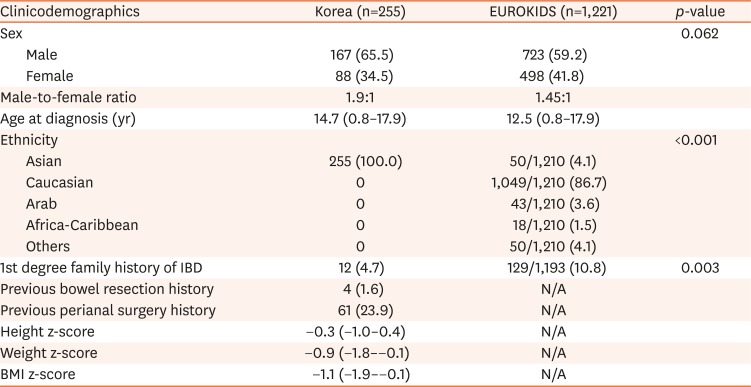
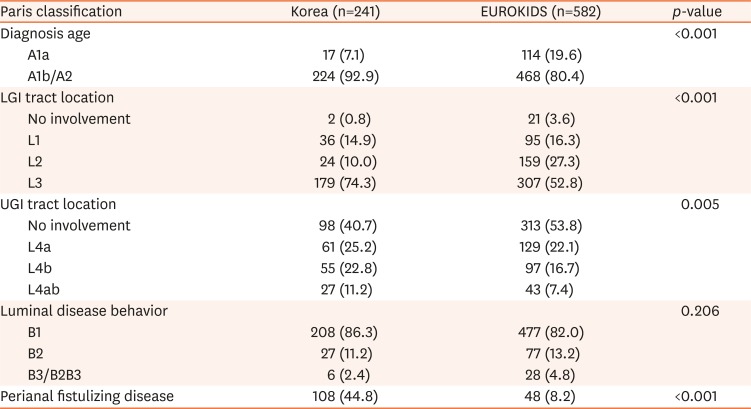
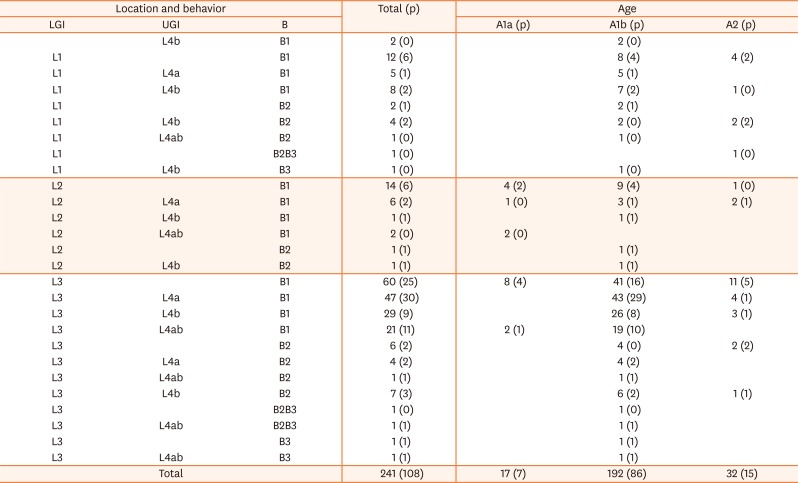

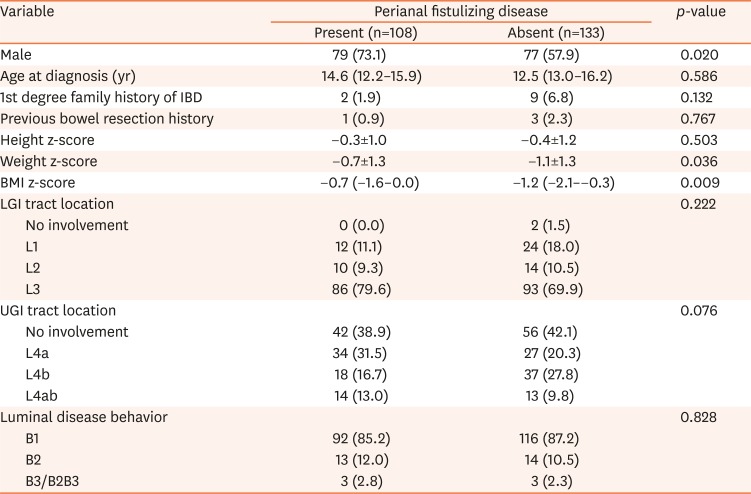





 PDF
PDF ePub
ePub Citation
Citation Print
Print



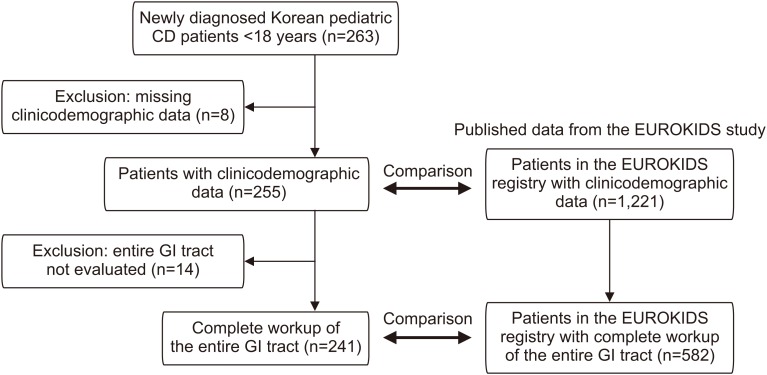

 XML Download
XML Download